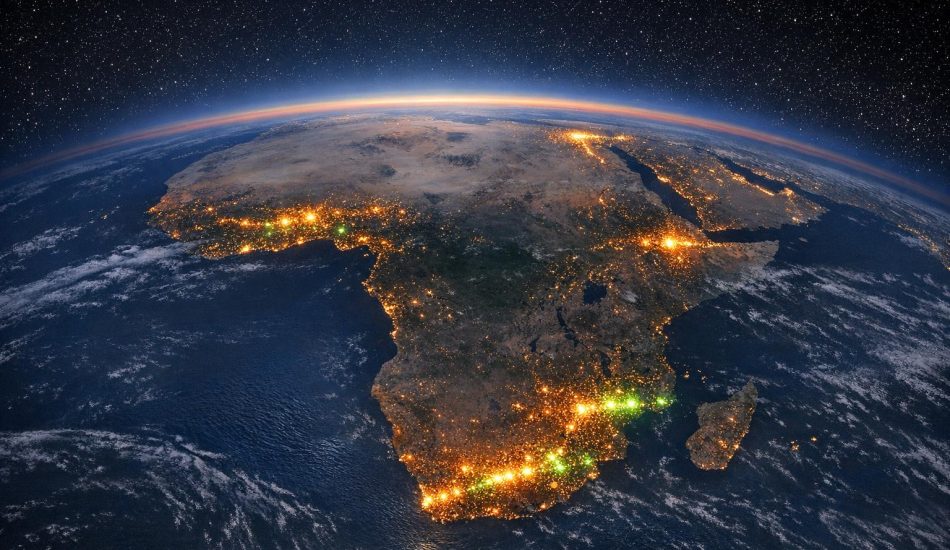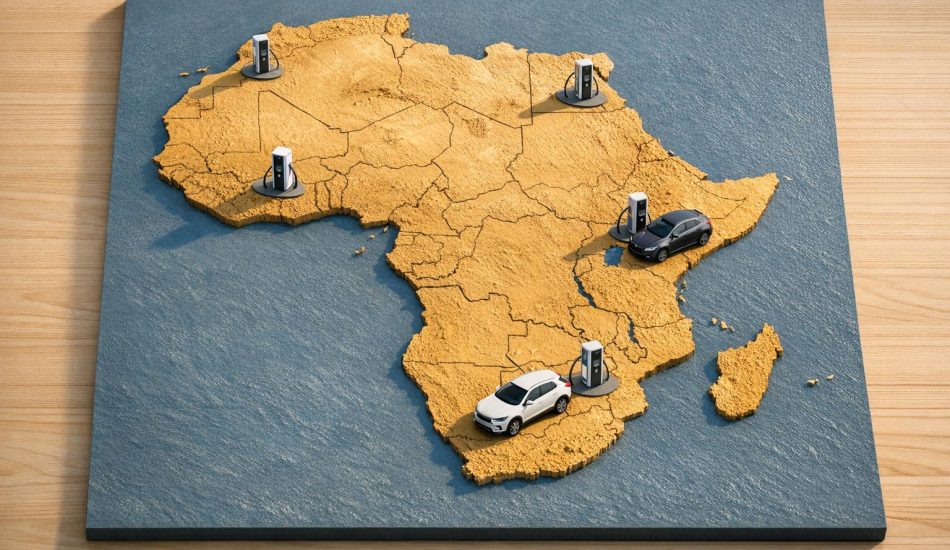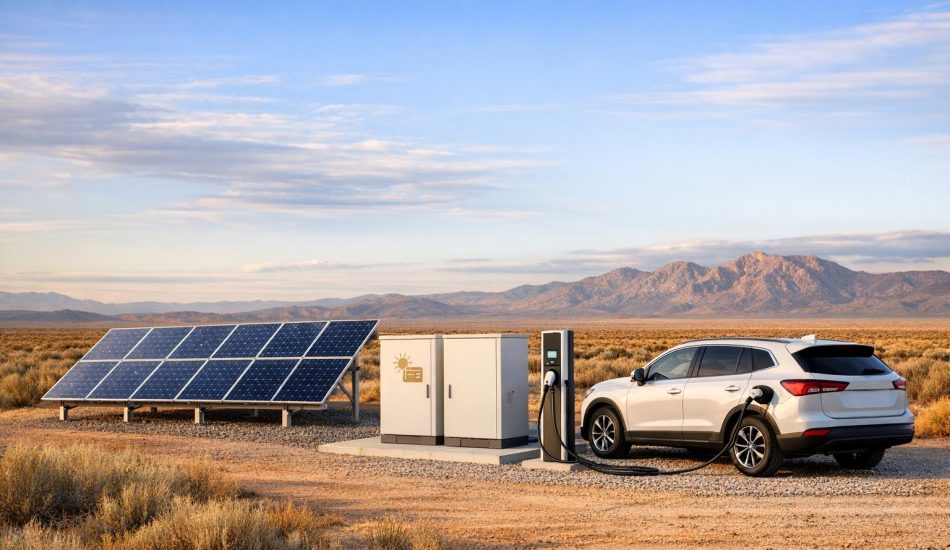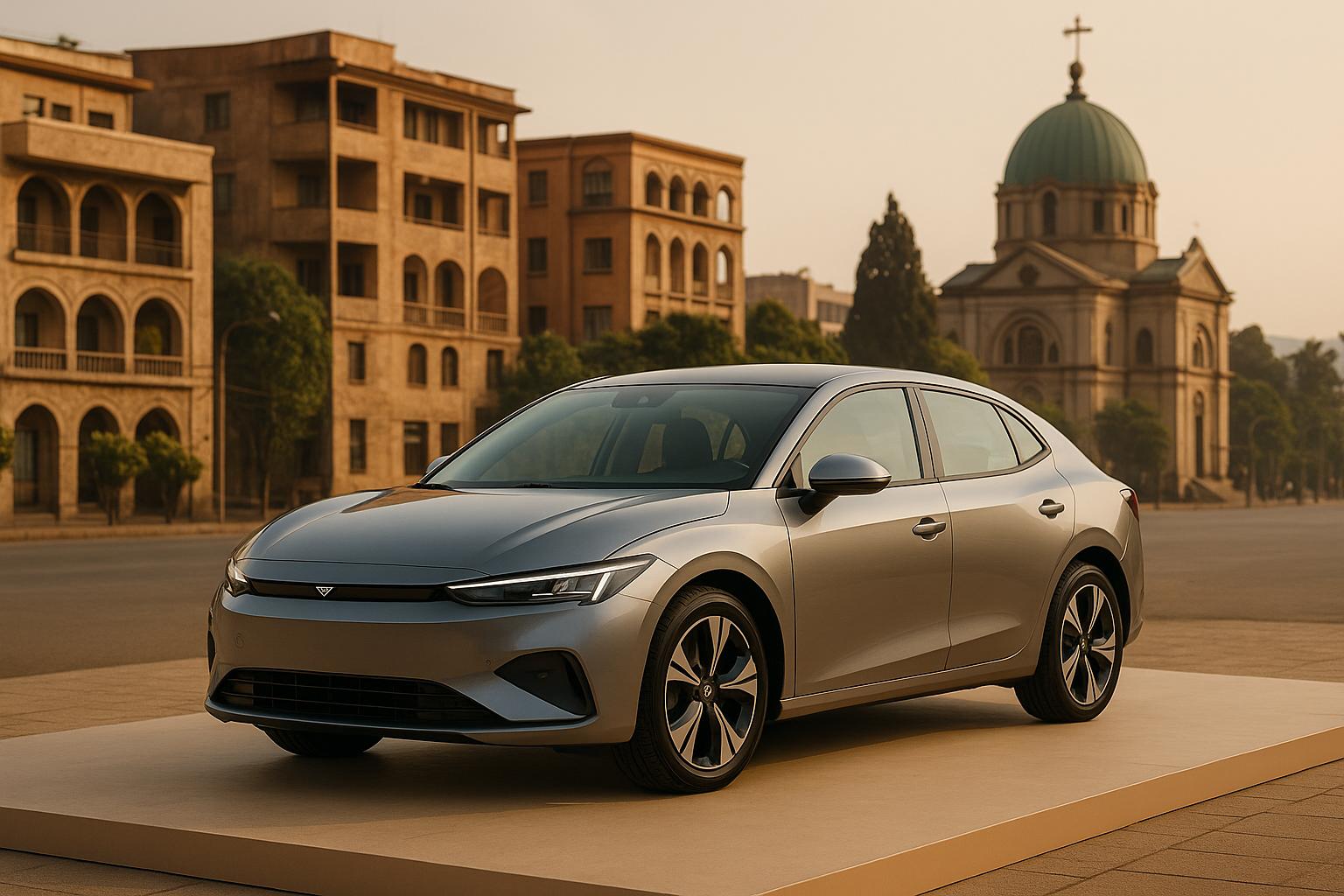
Looking to buy an electric car in Ethiopia? EV24.africa makes it simple. This platform lets you browse, compare, and order EVs online, offering models from over 20 brands like Tesla, BYD, and Volkswagen. With clear pricing, flexible payment options, and nationwide delivery, EV24.africa handles the entire process – from import to doorstep delivery.
Key Highlights:
- EV Growth in Ethiopia: EVs now make up 5% of cars, growing from 4,600 in 2023 to 14,000 in 2025.
- Government Support: Tax exemptions on EVs and a ban on non-electric private vehicle imports since 2024.
- Affordable Options: Models like Lingbox UNI start at $4,800, while high-end options like Tesla Model S are also available.
- Easy Ordering: Transparent pricing, financing plans, and two shipping options – Delivered Duty Paid (DDP) or Free on Board (FOB).
- Nationwide Delivery: Vehicles are imported via Djibouti and delivered to cities like Addis Ababa or remote areas.
Whether you’re in the city or a rural area, EV24.africa provides a straightforward way to join Ethiopia’s electric vehicle revolution.
Ethiopia bans imports of gas-powered private vehicles, but switch to electric is a bumpy ride
How to Order an Electric Car on EV24.africa
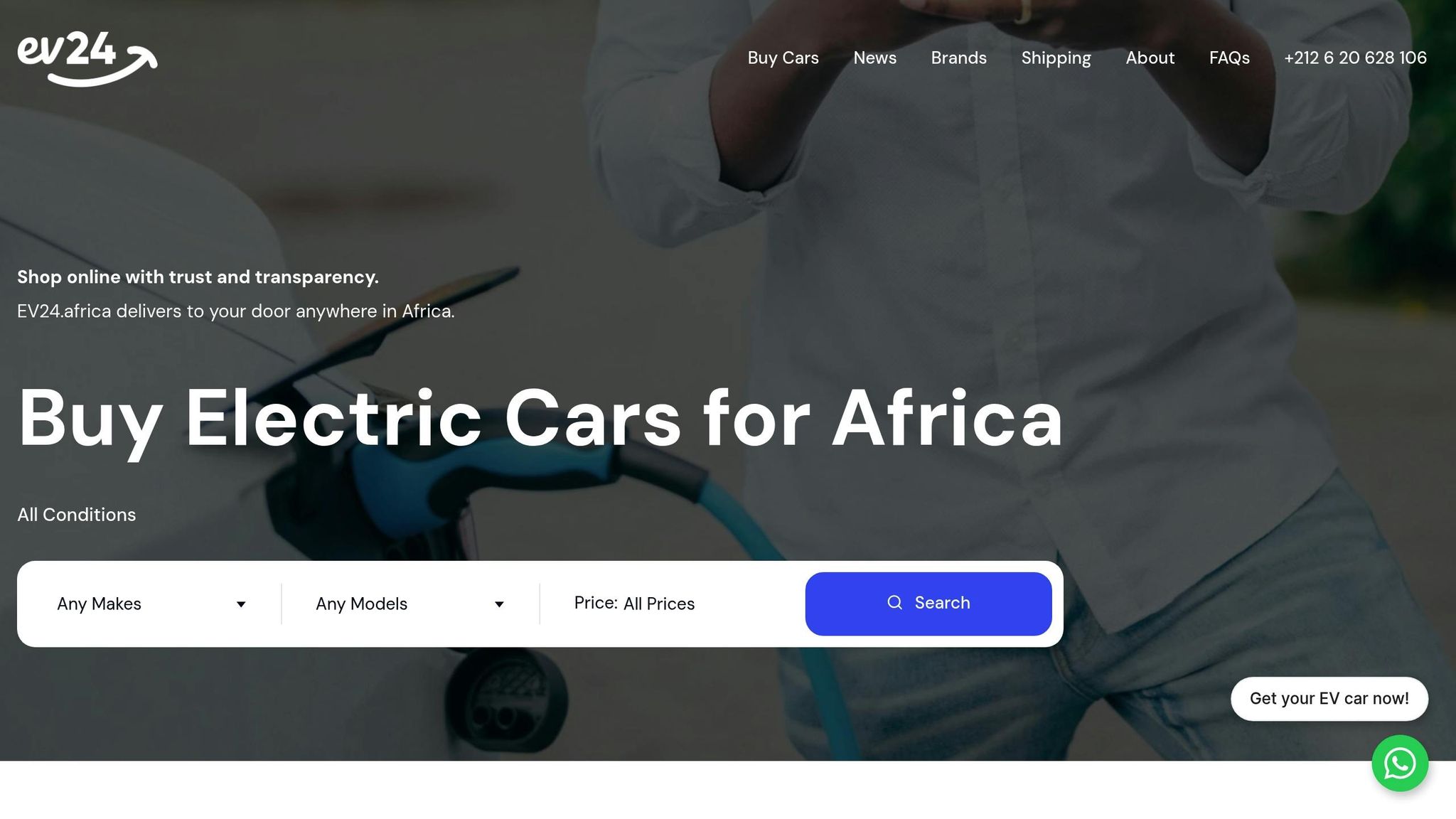
Buying an electric car through EV24.africa is straightforward. The platform simplifies the once-complicated import process into a few easy steps, making electric vehicle ownership more accessible for Ethiopian buyers, no matter where they are.
Setting Up Your Account and Exploring Vehicles
Starting on EV24.africa is quick and hassle-free – there are no fees or lengthy sign-up processes. Simply visit the website and browse their selection of electric vehicles. The platform features a wide range of EVs from top brands, each with detailed listings.
Each listing includes essential details like battery capacity, driving range, safety ratings, and interior features, along with clear photos and condition reports. You can use filters to narrow down your search by brand, price range, vehicle type, or specific features. Whether you’re after a compact city car or a high-end sedan, the platform’s user-friendly design makes comparing models seamless.
Transparent Pricing and Financing Options
All vehicle prices are displayed in US dollars (USD) to ensure consistency and make comparing models straightforward. Ethiopian buyers can easily convert these prices to Ethiopian birr using current exchange rates.
EV24.africa prioritizes transparency – vehicle prices are clear, and additional costs like shipping, customs duties, and local registration fees are outlined upfront. This clarity helps you budget with confidence, avoiding surprises later.
For buyers needing financing, EV24.africa collaborates with financial partners to offer flexible payment plans. These options are designed to fit various budgets, helping more people take the step toward electric vehicle ownership.
How to Place Your Order and Make Payments
After choosing your ideal electric vehicle, the ordering process is simple and secure. EV24.africa provides two shipping options:
- Delivered Duty Paid (DDP): EV24.africa handles customs clearance and paperwork for you.
- Free on Board (FOB): You manage the import process yourself for more control.
Payment is secure, with options like bank transfers and mobile money available. Once your order is placed, you can track it in real-time, following your car’s journey from purchase to delivery.
Vehicles are imported via the Port of Djibouti and transported overland to your chosen location in Ethiopia. This reliable logistics setup ensures timely delivery. For a complete quote, including purchase and delivery costs, contact EV24.africa. Their detailed quotes help you avoid unexpected expenses and keep the process smooth.
Next, explore their nationwide delivery options and after-sales services for added convenience.
Nationwide Delivery and Support Services
EV24.africa doesn’t just stop at offering a simple ordering process – it’s committed to ensuring your electric vehicle reaches you safely and that you have the support you need, no matter where you are in Ethiopia.
Delivery Across Ethiopia
To manage vehicle imports, EV24.africa uses the Port of Djibouti as a key entry point. From there, the company has established dependable overland transportation routes to deliver vehicles across Ethiopia. Whether you’re located in Addis Ababa, Dire Dawa, Bahir Dar, or even more remote regions, EV24.africa ensures your electric vehicle is brought directly to your doorstep or a convenient pickup point.
The company offers both door-to-door delivery and port-to-port pickup options from major Ethiopian cities. Working with trusted logistics providers, customs agents, and port authorities, EV24.africa ensures the entire process is smooth and hassle-free. Backed by a team of over 200 professionals across five African countries, the company has the expertise to handle the complexities of cross-border vehicle transportation.
Customers can choose between RoRo (Roll-on/Roll-off) shipping for a cost-effective option or container shipping for added protection. And once your vehicle arrives, EV24.africa’s commitment doesn’t end there – it extends to a full range of after-sales services.
After-Sales Services and Customer Support
Once your vehicle is safely delivered, EV24.africa works to make sure your electric mobility experience is as smooth as possible. Each purchase includes one year of free maintenance, access to a dedicated support team for technical assistance, and guidance on charging infrastructure. Additionally, a comprehensive refund policy ensures peace of mind.
The technical support offered goes beyond routine maintenance. The team provides detailed guidance on setting up and using charging infrastructure, helping you get the most out of your electric vehicle.
EV24.africa’s success isn’t limited to Ethiopia. In just three months, the platform has received over 350 qualified vehicle requests from more than 30 countries and successfully delivered vehicles to ten African countries. Younes Rabeh, Business Manager at EV24.africa, highlighted this rapid growth:
"In just three months, we’ve proven that the demand for electric mobility in Africa is not only real but accelerating. Our team is building more than just a marketplace – we are creating the infrastructure and services to support Africa’s electric transition on a large scale."
With this comprehensive delivery and support system, EV24.africa ensures that Ethiopian customers receive more than just a vehicle – they gain access to a complete electric mobility solution, backed by expertise and ongoing assistance.
sbb-itb-99e19e3
Electric Vehicle Models Available on EV24.africa
EV24.africa brings a variety of electric vehicles from top global brands like Tesla, BYD, Volkswagen, XPeng, and more. Each vehicle listing includes detailed specifications – such as range, battery type, and transmission – along with pricing in USD. Plus, delivery is available to all 54 African countries. Below, we’ve highlighted some standout models to help you find the perfect fit.
Popular Models and Their Features
For those seeking performance and practicality, the BYD ATTO 3 2025 offers a solid 420-kilometer range and is priced at $47,500. If luxury is your priority, the Tesla Model S delivers an impressive 840-kilometer range, with pricing available upon request.
Budget-conscious buyers aren’t left out. The GEELY PANDA MINI BASE, priced at just $5,880, provides a 120-kilometer range, making it ideal for city driving. Similarly, the LINGBOX UNI comes in at $4,800 with a 140-kilometer range, offering an affordable entry into electric mobility.
For a mid-range option, the BYD QIN PLUS EV 100 Kw delivers a 400-kilometer range at $14,180. On the other hand, the LEAPMOTOR T03 2024 strikes a balance between affordability and functionality, offering a 250-kilometer range at $9,500.
Top Electric Cars Comparison Table
Below is a comparison of top electric cars based on range, price, and their ideal use cases.
| Make | Model | Range (Miles) | Range (Km) | Price (USD) | Best For |
|---|---|---|---|---|---|
| Tesla | Model S | 522 | 840 | Not Listed | Long-distance travel, luxury |
| Zeekr | 009 | 511 | 822 | $85,000 | Premium family transport |
| Voyah | DREAMER EV | 295 | 475 | $97,000 | Luxury SUV needs |
| BYD | ATTO 3 2025 | 261 | 420 | $47,500 | All-around performance |
| BYD | QIN PLUS EV 100 Kw | 249 | 400 | $14,180 | Mid-range reliability |
| Dongfeng | NanoBox | 199 | 321 | $8,300 | Urban commuting |
| Leapmotor | T03 2024 | 155 | 250 | $9,500 | Budget-friendly daily use |
| Lingbox | UNI | 87 | 140 | $4,800 | Short-distance city driving |
| Geely | PANDA MINI BASE | 75 | 120 | $5,880 | Entry-level urban mobility |
Whether you’re looking for a compact EV for city commutes or a long-range model for intercity travel, EV24.africa has options to suit your needs and budget. The platform also aligns with Ethiopia’s vision of having 500,000 EVs on the road by 2030, reflecting a focus on reliable and efficient transportation.
Each vehicle listing provides comprehensive details, including specifications, warranty information, and feature descriptions. This ensures you can make informed decisions tailored to your driving habits and financial plans. With EV24.africa, stepping into the world of electric mobility has never been easier.
Important Considerations for Ethiopian Buyers
Switching to electric vehicles (EVs) in Ethiopia comes with its own set of challenges and opportunities, driven by the government’s push toward electric mobility. To make an informed decision, it’s crucial to understand local policies, infrastructure, and practical aspects of EV ownership.
Local Regulations and Incentives
Ethiopia has taken a bold step by banning fossil fuel vehicles, creating a significant shift in the market. One of the biggest advantages for EV buyers is the reduced import tax. While traditional vehicles face duties ranging from 100% to 300%, EVs are taxed at just 15%. For example, a Toyota bZ3X that costs $15,000 in China ends up retailing for around $48,000 in Ethiopia due to high import taxes on fossil fuel vehicles.
To encourage local production, the government is offering tax breaks for EVs assembled in Ethiopia. This has led to initiatives like Belayneh Kindie’s deployment of 100 electric buses in Addis Ababa. However, it’s important to note that all EVs must meet Ethiopian safety and technical standards for registration. Mandatory technical inspections should also be factored into your planning and budget.
Understanding these regulations is key as you navigate Ethiopia’s developing EV ecosystem, including charging infrastructure and maintenance options.
Infrastructure and Practical Tips
Ethiopia is steadily building its EV charging network. Currently, there are about 25 public charging stations, with plans to place stations every 31–75 miles (50–120 kilometers). The long-term goal is to establish 2,326 charging stations within the next decade.
Most EV activity is centered in Addis Ababa, where better electricity access and higher incomes support stronger infrastructure. If you live outside the capital, it’s essential to research local charging options and ensure they align with your typical driving routes. While Ethiopia generates about 90% of its electricity from hydropower, only 55% of the population has access to electricity, which can make reliable charging a challenge, especially in rural areas.
In regions with limited electricity, alternative solutions like solar panels or battery backup systems can help. As Teshale Natnael, a motorcycle taxi rider, explains:
"We don’t have electricity in our village… an electric scooter would be the ‘perfect solution’".
For convenience, apps like PlugShare or ChargeMap can help you locate nearby charging stations. Planning your trips carefully and adopting efficient driving habits will also maximize your EV’s range.
The financial benefits of EV ownership are becoming more apparent as gasoline prices continue to rise. Between January 2023 and January 2025, fuel prices doubled from $0.40 to $0.80 per liter. Over time, this makes EVs a more economical choice.
Maintaining an EV requires some extra effort. Regularly check tire pressure and consider using all-terrain tires for Ethiopia’s diverse road conditions. However, finding trained technicians and spare parts can be challenging. While training programs for EV technicians are emerging, they remain limited, and you may need to import parts when local options are unavailable.
The Ethiopian Electric Utility (EEU) is working to stabilize grid connections for charging stations, with plans for smart grid upgrades to improve reliability. Deputy Minister Deta Berro Hassan highlights the broader vision:
"The shift will reduce pollution, lower fuel import costs, create a cleaner, safer, and more affordable transport sector for all".
The EV market is growing rapidly. By 2024, over 60% of newly registered personal vehicles were electric, and the total number of personal EVs has nearly tripled – from 4,600 in early 2023 to around 14,000 by 2025.
Still, financing remains a hurdle. Formal credit is mostly available to salaried urban workers, limiting access for many potential buyers. Programs like those offered by Ride, which allow drivers to trade in their old internal combustion engine (ICE) cars for EVs and pay the balance in installments, are worth exploring.
Conclusion: Electric Car Ownership Made Simple with EV24.africa
EV24.africa has redefined the way Ethiopian customers purchase electric vehicles by cutting through the challenges traditionally associated with importing and buying EVs. As Africa’s first pan-African electric vehicle marketplace, the platform connects buyers to over 200 EV models from more than 50 global manufacturers, offering unparalleled variety and choice.
With its straightforward ordering process and all-inclusive service, EV24.africa takes care of everything – from logistics to paperwork. Supported by a team of over 200 professionals operating across five African countries and partnerships spanning over 40 nations, the platform ensures every step of the process is handled efficiently.
Ethiopian buyers also gain from EV24.africa’s expertise in navigating local policies, such as VAT and excise tax exemptions and reduced customs duties. Combined with reliable nationwide logistics, this ensures a hassle-free transition to electric mobility.
Deliveries are available to major cities like Addis Ababa and Dire Dawa, with real-time tracking and a standard delivery window of 4–8 weeks. Beyond delivery, EV24.africa offers battery and motor warranty coverage, access to spare parts, and even solar-powered off-grid charging options for rural areas.
"At EV24.africa, we simplify the process of importing and buying electric vehicles in Africa. Our expertise ensures a seamless, transparent, and stress-free experience, so you can focus on driving the future of mobility."
– EV24.africa
For Ethiopian buyers ready to embrace sustainable transportation, EV24.africa provides expert guidance, competitive pricing, and streamlined support. By combining a digital-first approach with deep automotive knowledge, the platform makes electric vehicle ownership practical and accessible. As Ethiopia leads the charge toward cleaner and greener transportation, EV24.africa is there to help its customers drive into a brighter future.
FAQs
What financing options does EV24.africa offer for electric vehicle purchases, and how do they help Ethiopian buyers?
EV24.africa is making electric vehicles more attainable for Ethiopian buyers by offering flexible payment options. These include interest-free payment plans and savings-based financing, which significantly lower the initial costs of owning an EV. On top of that, local credit companies are teaming up with international EV manufacturers to provide loan options, streamlining the entire purchasing process.
By easing financial barriers, these initiatives are helping more people in Ethiopia embrace electric mobility, contributing to the nation’s move toward cleaner and more efficient transportation solutions.
How does EV24.africa deliver and support electric vehicles in remote areas of Ethiopia?
EV24.africa is making electric vehicles available across Ethiopia, even in the most remote areas, thanks to its extensive logistics network. This includes dependable door-to-door delivery services and strategically located charging stations placed every 30 to 75 miles (50 to 120 kilometers), ensuring drivers can easily access the charging infrastructure they need.
To make things even easier for customers, EV24.africa offers maintenance services and dedicated customer support. These efforts address infrastructure challenges head-on, helping customers transition to electric vehicles without hassle – even in rural communities.
What should Ethiopian buyers know about local regulations and infrastructure when purchasing an electric vehicle from EV24.africa?
Ethiopian buyers need to know that starting in 2024, the government has mandated the import of only electric vehicles. These regulations emphasize key aspects like safety, long-lasting batteries, and a minimum driving range of 186 miles per charge.
To support this shift, Ethiopia is actively working on expanding its charging network. The plan includes installing charging stations roughly every 50 miles, backed by a legal framework to streamline this transition. These developments are important for buyers to keep in mind, ensuring compliance with the rules and a hassle-free driving experience throughout the country.


